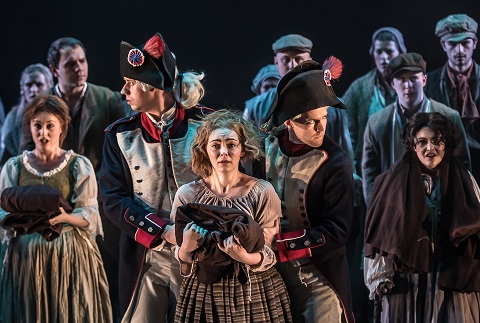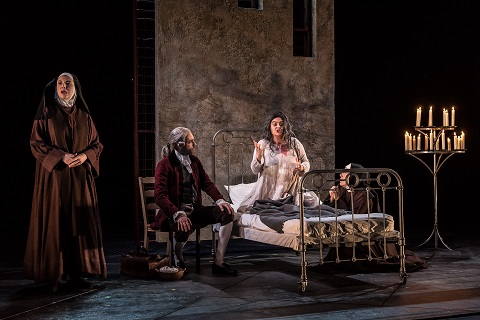This new production which Martin Lloyd-Evans has devised for the
postgraduate opera students at the Guildhall School may
share some of
Carsen’s
and his designer Michael Levine’s visual minimalism but it is altogether a
calmer, more intimate affair. Lloyd-Evans, conductor Dominic Wheeler and
the young cast pay great respect to this challenging work: it is no mean
feat to sustain a pretty well unrelievedly intense mood for so long, so
effectively.
The production team achieve this through a combination of period-specific
detail, simple iconographic statements by designer takis, and Robbie
Butler’s striking lighting design, which work collectively to both link the
tableaux-like episodes of Poulenc’s narrative and allow space for symbolic
gesture. Poulenc’s Stravinkian ostinatos injected momentum into the
unfolding rituals. Admittedly, though, spiritual serenity can be achieved
at the expense of inflamed passions, and some of the crowd scenes fell a
little flat, lacking a palpable sense of menace and terror.
And, though the Guildhall School tackled Poulenc’s opera just seven years ago, it does
seem a strange choice for a student production given that there are so few
roles for the men - and for those chaps taking those roles that do exist
there is not much time to establish credibility of character - and that
even the plentiful prioresses are seldom individualised. Moreover, the
grandeur of the choral scenes might seem to require more forces and funds
than the average music college can muster.
Commissioned in 1953 by La Scala, Dialogues des Carmélites is
based on a play by Georges Bernanos which dramatises the experiences of a
neurotically anxious young aristocrat, Blanche de la Force, who, in search
of spiritual peace and safety, leaves her family home at the beginning of
the French Revolution to join the Carmelite order in Compiègne.
But, the convent walls cannot keep out Revolutionary convictions. Blanche
and her fellow sisters are arrested and while she initially flees from the
oath of martyrdom that they have all taken under the guidance of the
formidable Mère Marie, as her sisters embrace the ultimate sacrifice,
Blanche returns to take her place at the scaffold.
What seems important, and what Lloyd-Evans and takis clearly appreciate, is
that this is not an opera about the French Revolution. Indeed, I can’t
find, or write myself, a better explanation of what the opera is ‘
about’ than this ‘explanation’ by Donald Spoto’s explanation in Opera News fifteen years ago:
‘It is rather a series of nearly classical dialogue-scenes in which issues
and questions of deeply human and religious significance are set forth,
explored and clarified. The key to its complex of ideas is to be found in
certain matters of the faith that claimed the loyalties of Poulenc and of
Georges Bernanos, whose lifelong motto was set forth at the end of his
novel Journal d’un Curé de Campagne (Diary of a Country Priest,
1936): “Tout est grâce” - everything is grace.’
[1]
This concept is powerfully embodied in one line in the libretto, when the
Le Prieure warns the overly fervent, naively self-righteous Blanche, who is
seeking to enter the order, ‘Prayer alone justifies our existence .... we
are bound to it day and night’. These words may be difficult for a
non-believer to understand or empathise with, but they underpin the opera,
and Lloyd-Evans’ production. The musical set-pieces of observance - the Qui
Lazarum, Ave Verum Corpus and Salve Regine - are architectural linchpins in
the unfolding sequence of tableaux through which the spiritual journeys of
Blanche and Mère Marie is conveyed. During the performance I was reminded
of the words of one of my colleagues, Anne Ozorio, who, writing of the last
GSMD production in
2011
observed that, ‘Dialogues des Carmélites … unfolds as a series of
disconnected tableaux, like the Stations of the Cross. This structure is
significant, for Poulenc is connecting the nun’s journey to the guillotine
to Christ’s journey to the cross. The narrative is deliberately stylized to
emphasize the spiritual and moral implications of the plot. It’s not simple
narrative.’
Various hanging flats - interior walls, marble edifices, grilles that evoke
both confessional chambers and prison gates (and when florally decorated,
garden trellises) - slide, diverge and re-form, at one point forming an
air-borne Crucifix, and ultimately coalesce as a granite headstone
memorialising the life of Blanche de la Force. The subtle movement and
prevailing stillness expressed an unassailable spiritual nobility.
 Claire Lees (Soeur Constance); Jake Muffett (1er Officer); Meriel Cunningham (Mere Gerald); Michael Vickers (Le Marquis); Eva Gheorghiu (Soeur Felicite). Photo credit: Clive Barda.
Claire Lees (Soeur Constance); Jake Muffett (1er Officer); Meriel Cunningham (Mere Gerald); Michael Vickers (Le Marquis); Eva Gheorghiu (Soeur Felicite). Photo credit: Clive Barda.
Lucy Anderson’s Blanche was fittingly unbalanced and febrile, and if at
first, in the scene with Michael Vicker’s luxuriously costumed Marquis de
la Force, her broad vibrato diffused the focus of the tone, then later,
when paradoxically attired in humble habit, the rich layers of her soprano
blossomed with lyric intensity. I was pleased, too, that the oft-cut spoken
scene, which links the final conversation between Marie and Blanche and the
assembling of the nuns in their prison cell, was retained. Blanche’s street
encounter with citizens who tell her of the arrest of the nuns and are
astonished by the emotive response of this ‘servant’ who declares she has
never been to Compiègne, is pivotal to her remorseful acceptance of her
place beside her sisters at the scaffold.
Chloë Latchmore’s Mère Marie was superbly acted and sung. She movingly
conveyed the spiritual misunderstandings that this fervent but sometimes
misguided nun must face, and her struggle to truly understand the new
prioress’s guidance that, ‘It is not up to us to decide whether our names
will later appear in a list of martyrs’ was deeply affecting. Latchmore has
a strong middle voice but can also project convincingly at the top,
whatever the dynamic; this was an utterly convincing vocal and dramatic
performance.
Georgia Mae Bishop threw her all into the Prioress’s all too human fears of
death (though the quasi-Gothic blue/black eye-shadow was perhaps a
supernatural step too far). Claire Lees captured Sister Constance’s gaiety
and unpretentious spiritual vision. The French diction of the entire cast
was exemplary.
Dominic Wheeler’s direction of the Guildhall School's instrumentalists reminded me how
sympathetic and helpful Poulenc’s orchestral writing is to the voices: at
times the orchestral fabric becomes a huge organ-like tapestry, supporting
their arioso lines. Elsewhere, the strings in particular conjured an almost
Tchaikovskian lyricism and ardency, while finely delineated woodwind
playing was complemented by warm and pretty reliable horns.
With the first UK performance of Jake Heggie’s Dead Man Walking
(at the Barbican Hall last Tuesday) fresh in my mind, the obvious narrative
parallels with Poulenc’s opera seemed strong. But, in Dialogues,
the spiritual mysteries are in the music itself, something which to me
seemed lacking in Heggie’s score, and Wheeler did much to communicate the
ambiguities and conflicts.
Much, of course, rests upon the opera’s final scene. Some might have wished
for more melodrama than Lloyd-Evans offered, but, for me, this opera is
about sacrifice - a journey through fear of death to faith in martyrdom -
and this needs no grand gestures. Earlier in the opera, the second prioress
confronts the Revolutionary Officer who comes to arrest the nuns, and who
taunts their readiness to remove their religious habits: ‘Your
uniform does not make you a soldier.’ And, while Lloyd-Evans’ closing
gesture pays a nod to the opening image of Carsen’s production - of neatly
folded habits decorously arrayed across the ROH stage - as each of the
nuns stepped forward and placed her brown habit on the ground, and the
shocking swishing of the guillotine sent shudders through the instrumental
texture, we understood that this humble ‘offering’ was a sign of spiritual
serenity and transcendence.
Claire Seymour
Poulenc: Dialogues de Carmélites
Blanche - Lucy Anderson, Le Chevalier/Premier Commissaire - Daniel
Mullaney, L’Aumônier - Eduard Mas Bacardit, Le Marquis - Michael Vickers,
Premier Officer - Jake Muffet, Le Prieure/Mère Jeanne - Georgia Mae Bishop,
Soeur Constance - Claire Lees, Mère Marie - Chloë Latchmore, La seconde
Prieure - Michelle Alexander, Soeur Mathilde - Lucy McAuley, Deuxième
Commissaire/Theirry/M.Javelinot/Le Geôlier - Bertie Watson; director -
Martin Lloyd-Evans, conductor - Dominic Wheeler, scenography and costume
designer - takis, lighting designer - Robbie Butler.
Guildhall School of Music and Drama, Silk Street, London; Monday 26 th February 2018.
[1]
Donald Spoto, ‘Dialogue on Carmélites II: A Roman
Catholic's Perspective’, Opera News, Jan 2003, Vol. 67,
Issue 7.

